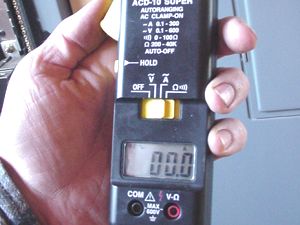


|

|
Testing for Electricity |
|
Testing for electricity is fairly easy and safe as long as you are careful. This article will show you where to put the test leads on outlets, switches and light sockets and plain old wire, but does not explain how electricity works. Electricity is dangerous, having at least a basic understanding is a good thing. If, in the course of your project, you feel uncomfortable with any aspect: STOP and call an electrician |
 |
|
Items needed:
Circuit Tester
Screwdriver |
Safety Suggestions and Tips
Make sure that your hands never touch the metal part of the test leads.
|
Level of difficulty
 Time Required: 1 hour
|
|
|
|
Steps |
|
|
|
|
Step 1: Testing Installed Outlets for Current: Connect leads to your circuit tester (Make sure you NEVER touch the metal leads on the tester) |
|
Step 2: Insert one lead in each opening. The tester will glow red if current is present. |
|
Step 3: One note about this test: It is possible to stick the circuit tester into a live outlet and get no indication of current. When you use the circuit testers with the little red light (I think it is neon), make sure that you move it around a bit if you get no reading. |
|
Step 4: Testing installed Outlets for Ground If you need to test an installed outlet for ground, stick one lead into the right (short) slot and the other lead into the U shaped ground hole at the bottom. If the light glows, the outlet is grounded. If the light does not glow, take the lead from the right slot and put it in the left slot. If the tester does not glow in either position, your outlet is not grounded. |
|
|
|
|
|
|
|
Related articles
|
||||